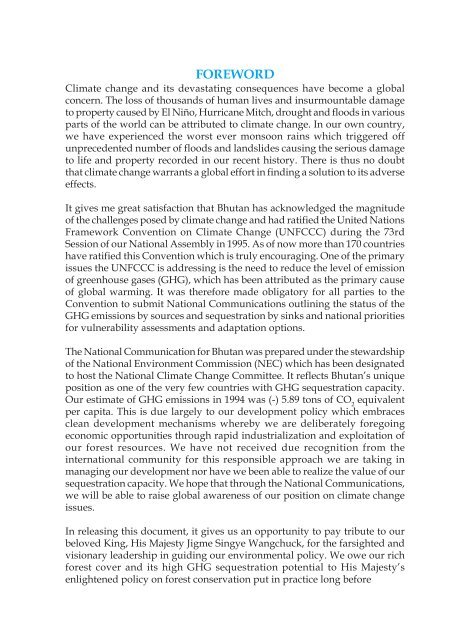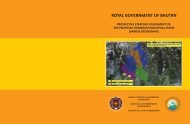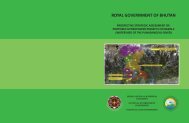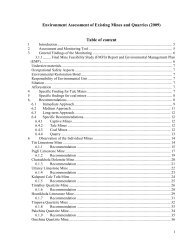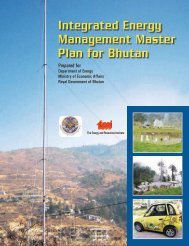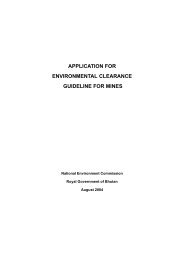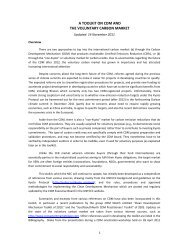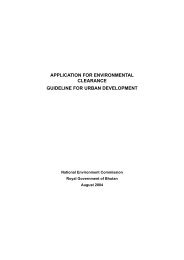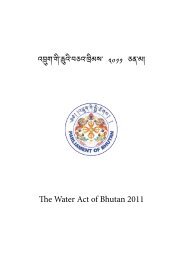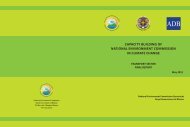Initial National Communication, under UNFCCC, September 2000
Initial National Communication, under UNFCCC, September 2000
Initial National Communication, under UNFCCC, September 2000
Create successful ePaper yourself
Turn your PDF publications into a flip-book with our unique Google optimized e-Paper software.
Convention on Climate Change<br />
59<br />
FOREWORD<br />
Climate change and its devastating consequences have become a global<br />
concern. The loss of thousands of human lives and insurmountable damage<br />
to property caused by El Niño, Hurricane Mitch, drought and floods in various<br />
parts of the world can be attributed to climate change. In our own country,<br />
we have experienced the worst ever monsoon rains which triggered off<br />
unprecedented number of floods and landslides causing the serious damage<br />
to life and property recorded in our recent history. There is thus no doubt<br />
that climate change warrants a global effort in finding a solution to its adverse<br />
effects.<br />
It gives me great satisfaction that Bhutan has acknowledged the magnitude<br />
of the challenges posed by climate change and had ratified the United Nations<br />
Framework Convention on Climate Change (<strong>UNFCCC</strong>) during the 73rd<br />
Session of our <strong>National</strong> Assembly in 1995. As of now more than 170 countries<br />
have ratified this Convention which is truly encouraging. One of the primary<br />
issues the <strong>UNFCCC</strong> is addressing is the need to reduce the level of emission<br />
of greenhouse gases (GHG), which has been attributed as the primary cause<br />
of global warming. It was therefore made obligatory for all parties to the<br />
Convention to submit <strong>National</strong> <strong>Communication</strong>s outlining the status of the<br />
GHG emissions by sources and sequestration by sinks and national priorities<br />
for vulnerability assessments and adaptation options.<br />
The <strong>National</strong> <strong>Communication</strong> for Bhutan was prepared <strong>under</strong> the stewardship<br />
of the <strong>National</strong> Environment Commission (NEC) which has been designated<br />
to host the <strong>National</strong> Climate Change Committee. It reflects Bhutan’s unique<br />
position as one of the very few countries with GHG sequestration capacity.<br />
Our estimate of GHG emissions in 1994 was (-) 5.89 tons of CO 2<br />
equivalent<br />
per capita. This is due largely to our development policy which embraces<br />
clean development mechanisms whereby we are deliberately foregoing<br />
economic opportunities through rapid industrialization and exploitation of<br />
our forest resources. We have not received due recognition from the<br />
international community for this responsible approach we are taking in<br />
managing our development nor have we been able to realize the value of our<br />
sequestration capacity. We hope that through the <strong>National</strong> <strong>Communication</strong>s,<br />
we will be able to raise global awareness of our position on climate change<br />
issues.<br />
In releasing this document, it gives us an opportunity to pay tribute to our<br />
beloved King, His Majesty Jigme Singye Wangchuck, for the farsighted and<br />
visionary leadership in guiding our environmental policy. We owe our rich<br />
forest cover and its high GHG sequestration potential to His Majesty’s<br />
enlightened policy on forest conservation put in practice long before


